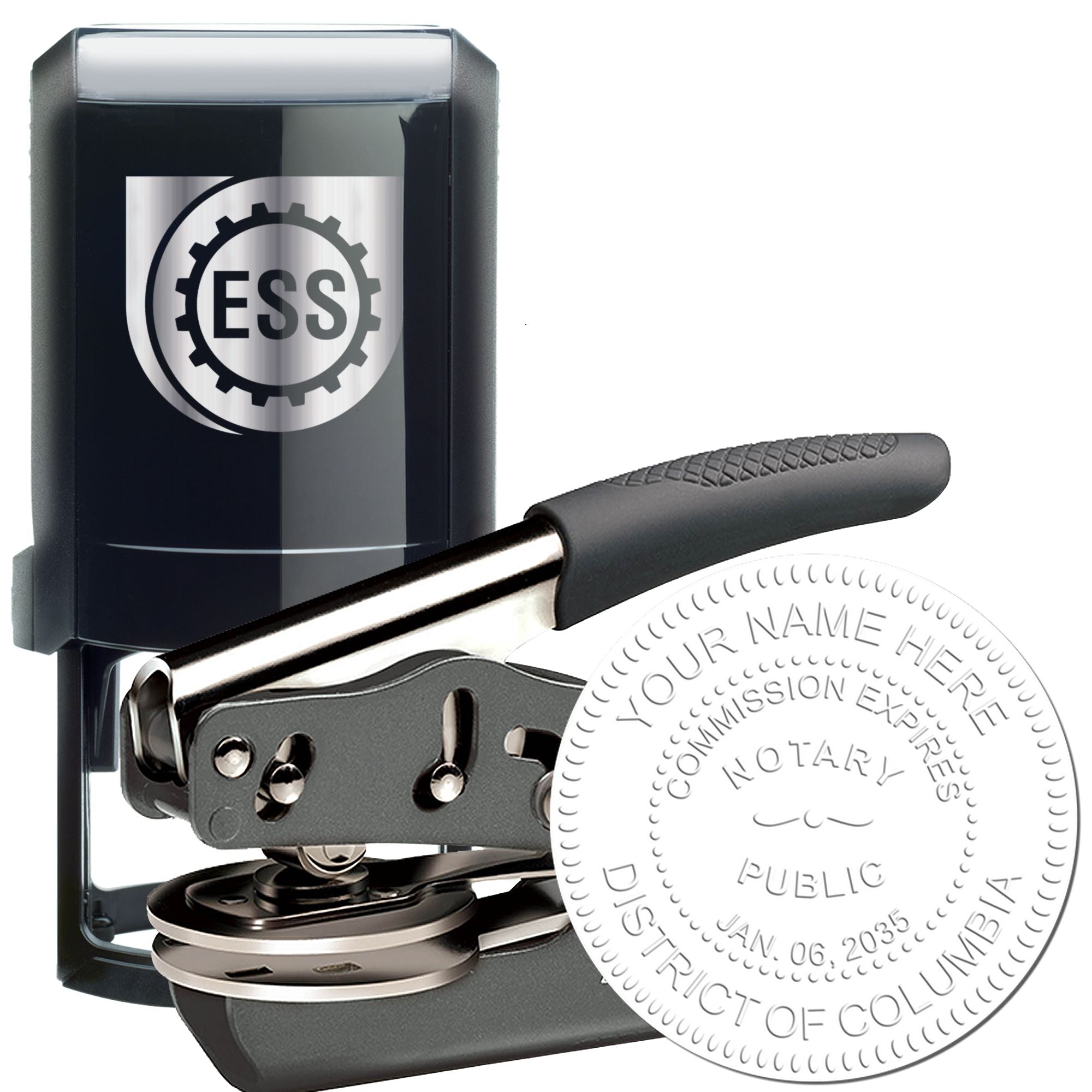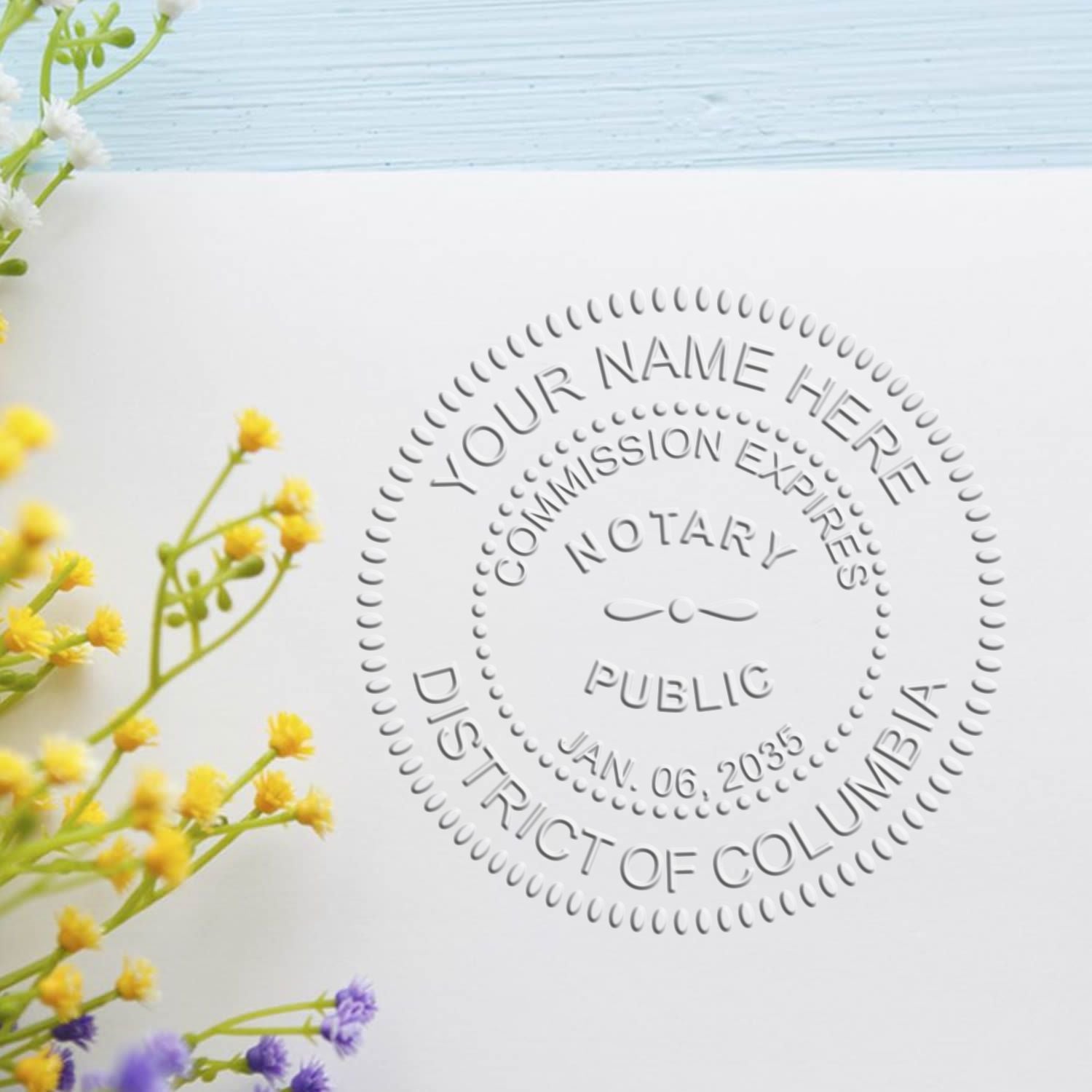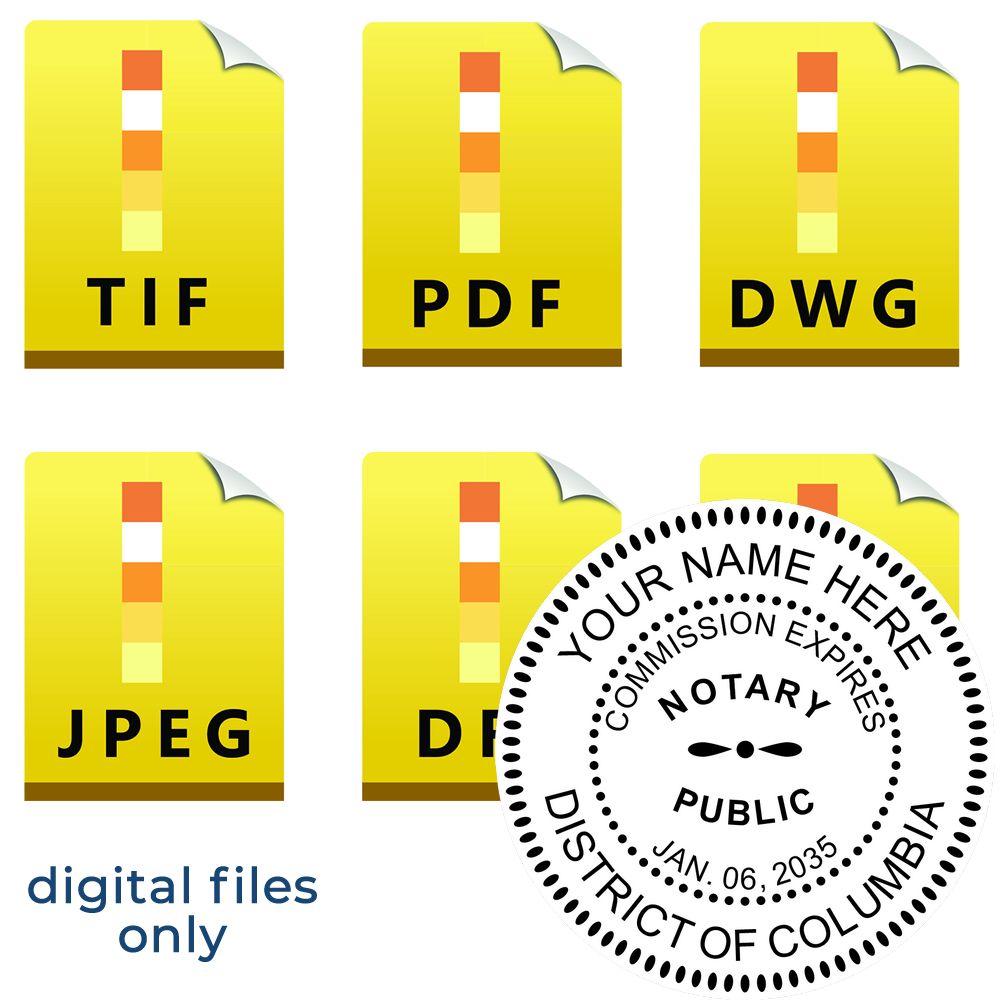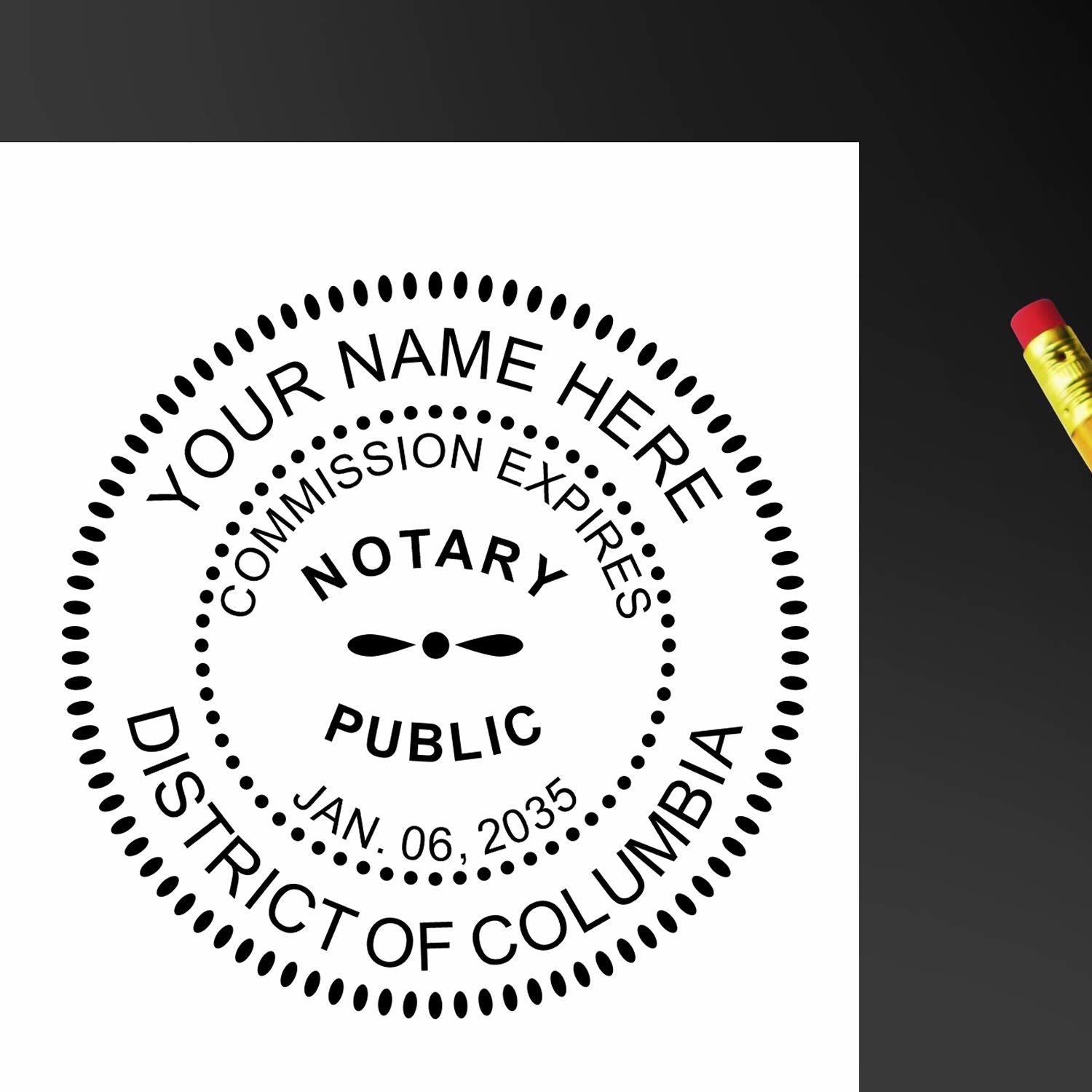Shopping for a district of columbia notary stamp can feel overwhelming, especially if you’re unsure about legal requirements or the best supplier to trust. You want a stamp that meets strict regulations in the District of Columbia (often abbreviated D.C.) while also suiting your personal style. Throw in questions about ink types, embossers, and digital formats, and you might be tempted to slap a sticky note on your desk that says, “Figure this out later!” Let’s chat through everything you need to know so you can feel confident about your choice.
Understanding District Of Columbia Notary Stamps
A notary stamp in D.C. isn’t just another office accessory. It serves as a formal, legal mark verifying your authority to witness signatures and authenticate documents. Because of this, consistency matters. State guidelines dictate that your stamp contains your name precisely as it appears on your notary commission, plus essential details like commission expiration and jurisdiction.
Choosing the right stamp means balancing professional appearance with compliance. If your impression is unclear or missing information, it could invalidate a notarized document. By knowing what elements to include on your stamp, you’ll avoid mistakes that cost time, money, and credibility.
Why Accuracy Counts
- A smudged impression may be rejected by agencies or clients.
- Missing commission details can undermine the document’s validity.
- Correct formatting speeds up notarization and keeps you looking professional.
You’ve likely seen old-fashioned metal embossers in popular culture. While metal embossers remain a common choice, rubber self-inking or pre-inked stamps are also popular for modern convenience. And if you’re handling a large volume of documents, a pre-inked or self-inking model saves time, effort, and inky fingers.
Consider Legal Requirements
The District of Columbia has specific guidelines for notaries, from the layout of your seal to the wording you must include around the edges. You’ll likely see instructions that your stamp must feature the notary public’s name, the words “District of Columbia,” and something along the lines of “Notary Public” or “Official Seal.” Always confirm you’re referencing the most recent D.C. notary regulations to avoid outdated instructions.
Common Requirement Categories
- Name and Commission Data: Matches your legal notary commission documents.
- State or District Identification: “District of Columbia” is typically required.
- Notary Role: “Notary Public” or “Official Seal,” so there’s no confusion about your authority.
- Expiration Date: Some guidelines recommend including your commission’s expiration date for clarity.
The rules are in place to protect both you and the public. A precise stamp ensures that anyone glancing at a notarized document can instantly verify it’s legitimate. If you’re unsure of the guidelines, you can reach out to local notary officials or visit online resources detailing District of Columbia laws.
Explore Key Stamp Features
Beyond the basics, stamps come in multiple varieties with different features. Ask yourself how frequently you notarize documents, what kind of documents these are, and whether you’re usually on the go. A traveling notary might prefer a compact stamp, whereas in an office environment, you might want a sturdy embosser for that crisp, raised impression.


Self-Inking vs. Pre-Inked
- Self-Inking: Contains a built-in ink pad and re-inks after each impression. Generally good for a few thousand stamps before needing a refill.
- Pre-Inked: Uses a reservoir of ink within the stamp itself, producing very sharp impressions. The ink reservoir can dry out over time but typically lasts through many uses.
Rubber Hand Stamps
Rubber hand stamps require a separate ink pad. They may offer more design flexibility, but they can be a bit messier. If you only notarize occasionally, though, rubber hand stamps are cost-effective and get the job done.
Embossers
Embossers create a raised feel on paper. They’re considered highly official, though they can be tougher to read if the page is copied or scanned. In some cases, you might pair an embosser with an ink stamp to ensure clarity.
If you’re still on the fence about which type to choose, consider how many documents you typically handle in a week. Quick, repeated use often favors a self-inking or pre-inked model. If you love the traditional look and operate in a more formal environment, you might go with an embosser.
Choose A Trusted Supplier
You might be thinking, “Where in the world do I find a supplier that meets these guidelines?” This is where working with a reputable company makes all the difference. Engineer Seal Stamps, for instance, has over 60 years of experience in producing District of Columbia notary stamps and seals. They understand how important it is to get every detail right, from spelling to layout.
Why Partner With Engineer Seal Stamps
- Deep Expertise: With decades in the business, they know the ins and outs of D.C. regulations and design, ensuring your stamp meets local laws.
- A Range Of Options: From self-inking to embossers, they have a variety of products that suit different needs and budgets.
- Quick Service: Time is money when you’re running your notary practice, and you don’t want to wait weeks for your stamp to arrive.
- Free Digital Stamp: A digital version can speed up your workflows if you deal with electronic documents.
- Trusted Reputation: Over six decades in any industry speaks volumes about reliability.






When researching stamp suppliers, make sure they offer clear guidelines on how to submit your notary name and commission info. Also, read testimonials and check for online reviews that mention the supplier’s accuracy and customer service. A few extra minutes spent confirming a company’s track record might save you from headaches down the road.
Make Use Of Quick Ordering
Once you’ve nailed down your stamp style, it’s time to put that decision into action. Fortunately, reputable suppliers typically provide easy online ordering to save you a trip across town. You’ll fill in your name and commission details, scan your notarized commission certificate (if asked), and select any upgrades you want.
Smart Ordering Tips
- Double-Check Spelling: Make sure the name on your commission matches exactly, including middle initials or suffixes.
- Confirm Ink Color: Some jurisdictions require specific ink colors, often black or blue.
- Look For Bundles: Many suppliers offer a package deal on related products, like extra ink or a handy storage case.
If you’re ordering through Engineer Seal Stamps, be on the lookout for promotions. They sometimes bundle special offers, like a free digital stamp, which might help if you often handle electronic documents. You’ll also benefit from their quick service, because nobody wants to hold off on official duties just because the essential supplies haven’t arrived yet.
Maintain Stamp Quality
After all the research and purchasing is done, it’s easy to stash your stamp in a drawer and forget that it needs occasional upkeep. Proper maintenance helps you create crisp, clear impressions every time, prolonging the life of your supplies.
Extend The Life Of Your Stamp
- Store Properly: Keep your stamp in a dry area, away from direct sunlight that can dry out ink.
- Clean Gently: If ink builds up on the surface, a quick wipe with a damp cloth usually does the trick. Avoid harsh chemicals.
- Refill Promptly: If your self-inking or pre-inked stamp starts fading, refill the ink or re-ink your pad as soon as possible.
Over time, your commission details might change, or you might renew and get a different expiration date. When that happens, remember to update your seal. Having the correct information at all times is crucial to staying within D.C. guidelines. If you’re unsure about what changed or how to reflect new details, feel free to reach out to district of columbia notary supplies experts who track official instructions. They can guide you through any updates, ensuring your seal remains valid.
You’ll also want to protect your stamp from unauthorized use. Even if you trust your colleagues, never leave an official seal lying around. The entire point of notarial rules is to protect the integrity of signatures and documents. Small step, big impact.
It’s a good idea to use the free digital stamp (if provided by your supplier) for electronic notarizations or docuwork that requires a verified stamp in PDF format. This approach is great for remote or hybrid workplaces. Just be sure you follow any relevant e-notarization laws in D.C.
Frequently Asked Questions
Q1: Do I Need Multiple Stamps?
You only need one official notary stamp that meets District of Columbia requirements. However, some notaries prefer having a backup or different styles (e.g., a handheld embosser and a self-inking stamp) for various scenarios. The key is ensuring that each stamp follows the same legal guidelines.
Q2: How Often Should I Replace My Stamp?
The lifespan of your stamp largely depends on usage. Self-inking and pre-inked stamps generally last for thousands of impressions before you need to replace or refill the ink pad. If you notice faint or incomplete impressions, it might be time for a refill or a replacement. It’s also normal to upgrade to a new stamp if your commission details change.
Q3: Is The Free Digital Stamp Actually Useful?
Definitely. A digital stamp comes in handy for electronic notarizations or for securely marking PDFs. Some notaries also like to place their digital stamp on website pages or email signatures to demonstrate their authority. It won’t replace the physical stamp for official in-person validations, but it’s a terrific supplement.
Q4: Can I Skip An Embosser And Just Use Ink?
Yes, you can skip an embosser if you’d prefer an ink-based stamp, provided you meet D.C.’s regulatory requirements. Many modern offices use ink-only notary seals because they scan and copy more clearly. That said, an embosser can be a nice touch if you work in a highly traditional setting or want extra security against tampering.
You’re now equipped with the know-how to choose a District of Columbia notary stamp that meets your precise needs. From understanding legal requirements to exploring different stamp types and picking a dependable supplier, each step is simpler when you break it down. Engineer Seal Stamps is there to help with fast shipping, top-quality products, and a free digital stamp to boot. Whether you’re new to the notary world or renewing your longtime commission, the right stamp is just a few clicks away.
Try ordering your notary stamp today, and you’ll see how a reliable seal elevates your professional image. If you have more questions, feel free to reach out to an experienced supplier or check local D.C. notary guidelines for more details. Having the proper supplies means you can notarize documents confidently, so your clients and colleagues know they’re in trustworthy hands.









































